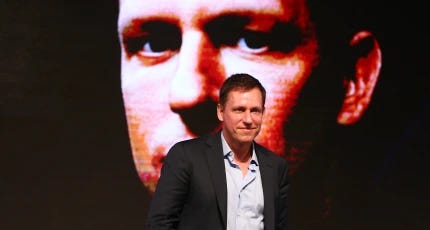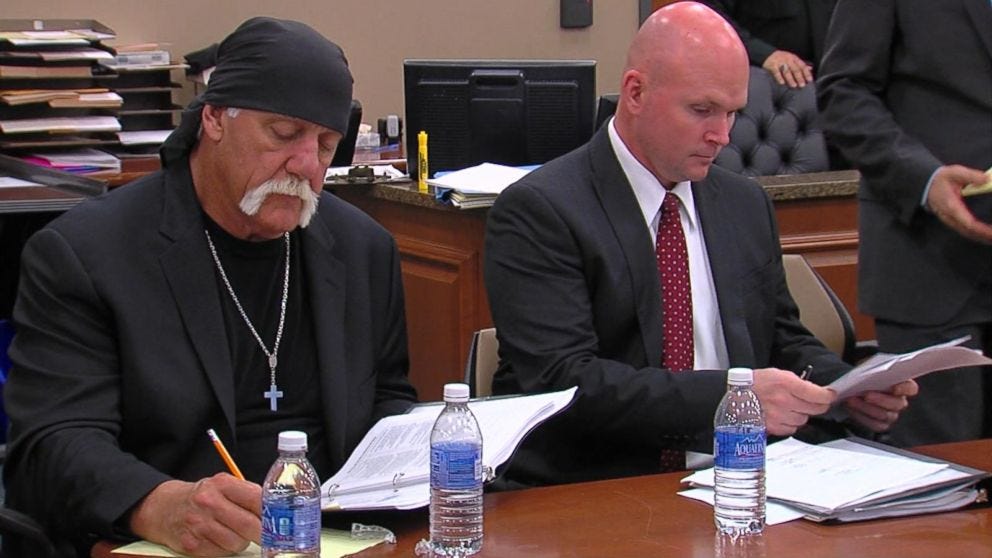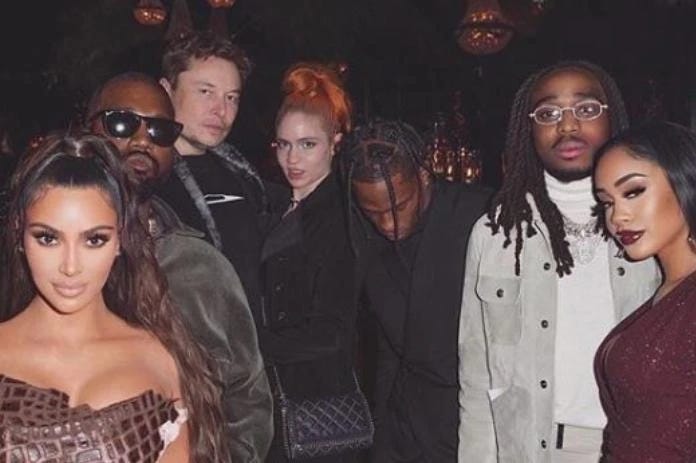What Do Kim Kardashian and Elon Musk Have in Common?
What Happens When Kim Kardashian Wants to Conquer the Same Culture of Reproduction that Created Her?
In little over a decade, Kim Kardashian ascended from gaudy SoCal wannabe to a member of the global elite, increasingly affiliated with figures like Jeff Bezos and Elon Musk.
In fact, just today, Elon Musk assembled and filed his $46.5 billion dollar plan to try take over Twitter, the same platform that partly facilitated Kim’s rise to prominence (I’ll explain exactly how Twitter helped Kim in a future piece).
Thanks to Keeping Up with the Kardashians, it feels as though we’ve watched every step of Kim’s climb. Analysis of her American Dream allegory shows that a combination of privilege, business acumen, and media strategy built Kim towards the billionaire’s club. Now that she belongs to it, has her relationship to media — and power — shifted at all? During the series premiere of The Kardashians, Kim coped with a crisis in a way that reminded me a bit of tech moguls Peter Thiel and Elon Musk.
In the episode, which was titled “Burn Them to the F*cking Ground,” the family gathers at Kim’s home to enjoy one of their catered lunches and commemorate the commencement of filming. Suddenly, Saint West — Kim Kardashian and Kanye West’s six-year-old son — runs up to his mom, giggling, and holding an iPad. When she checks its screen, she’s distraught by what she sees. A Kim crying meme has been posted to the popular gaming site, Roblox, and she tells Saint that if her image is being used for a game, they’ll be suing.
But that’s not all. The meme’s context sent an ominous message: Ray J was threatening to release “unseen” footage of their infamous 2007 sex tape, which Kim is “99.9 percent sure doesn’t exist, unless he stuck a dildo in my butt while I was sleeping or something.”
Later, while on the phone with her lawyer about the situation, Kim declares: “I have all the, time, all the money, and all the resources to burn them all to the f*cking ground.”
A few prominent points emerge from the situation:
1. Apropos to Kim’s vivid “dildo” quote, the episode could be viewed as a useful conversation-starter about revenge porn. Love or hate Kim Kardashian, no woman deserves to have explicit content exposed without her consent.
2. It also reminds us that eventually, The West children will have access to all the internet-documented antics of their parents, and that’s a crazy family reckoning to even fathom.
3. The situation raises speculation about whether Roblox would really be referenced by name so regularly — on a television show famous for its product placement— without paying for the ad time. I, for one, googled the name of the company to find out what it was.
4. Finally, the drama served narrative function. “I’ll burn them all to the f*cking ground” was a sound bite used in various trailers for the show, and some assumed it was in reference to Kim’s famously fraught divorce from Kanye. If that turned out to be the case, I would have been bowled over. Even when Kimye drama gets dark, Kim maintains a strict PR strategy of tact. This crisis — featuring phantom bad actors from the past — enabled Kim to engage in camera-friendly conflict that perhaps accurately echoed the tone of her life at the time, without exposing the deeper dramas she may prefer to keep private.
None of that necessarily means the situation was staged, and none of it is what captivated me most. What got me was Kim’s readiness to go to war because this time she could, and I see a little irony in that fact (in a mostly symbolic sense).
How? Free exchange of Kim’s image — which began with a sex tape leak, grew with her popularization of selfies, and continued with the endless proliferation of Kardashian memes — was key to her career’s virality.
What I mean is: the Kardashians brilliantly made the most of an event that was typically used to shame women, at a time when sexual content was what made the internet go round, while half-heartedly stamping out the rumors that they leaked it themselves. An adage we now often associate with the Kardashians began to echo: it got people talking. Conversation was stimulated not only by the sex tape itself, but by the logistical ambiguity and moral outcry surrounding it.
A little later, upon the advent of smartphones, Kim quickly colonized the concept of “selfies” by sharing them to her social media accounts, explaining how to take the perfect selfie in interviews, and even publishing a book of her own selfies called “Selfish.”
Because of this, the selfie became the Kim Kardashian signature. When she made public appearances, or if fans saw her out, the sought-after souvenir was always a selfie, further propagating her likeness across social networks and asserting a singular message: Kim is content - in the most new media sense of the word.
Kardashian memes provided a similar function. There are so many Kardashian memes, from Kim crying in the ocean about her earring, to Kim crying in the pink robe about Kris Humphries, to Kim in bed with the covers to her chin, to Kim splayed on a bed, wearing Yeezy.
At some point, the Kardashians may have figured out that memes were free press, and I’ve speculated before on Kardashian Kolloquium that the family might even stage meme-able scenarios and poses to encourage further proliferation of their images. This adds a double dose of irony to the episode’s Roblox scandal: the news was delivered via one of Kim’s most popular social media memes.
So, what changed? Why wouldn’t Kim be okay with another — if not slightly more epic — content drop? Especially when most people have already seen the tape?
Because she’s finally “made it.” All that free exchange —each selfie and every viral meme that made her a little more famous — has done for her what she needed it to do. Now? Media might need Kim for headline clicks more than Kim really needs media’s validation. Power has shifted.
The Roblox drama indicates the iconic value of the career-launching tape itself. Given the status Kim has achieved, and the social media-perpetuated stage of consumption we’ve reached in pop culture, the notion that “more” exists of the fateful tape is titillating not only in a pornographic sense but in a memorabilia sense. The Kardashians’ self-commodification drives a significant portion of the media economy, so “unseen footage” of early-career Kim is as good as a million-dollar, special-edition beanie baby. Kim — the billionaire businesswoman — isn’t going to let anyone scoop that capital from under her. And should she?
(We live in a society that commodifies women’s bodies and sexualities while also refusing to acknowledge that sex work is work. Another article could approach Kim’s reclamation of her sexual capital through an entirely different lens)
Still, the amount of litigious language used in the episode, even before Kim finds out it’s a sex tape issue — she tells Saint they might sue Roblox, later we see a whole scene of Kim demanding her lawyer to be as aggressive as possible with Ray J’s team — somehow felt like a performance for the audience’s benefit; an assertion that Kim won’t be accepting funny business from anyone, and that includes us. What, exactly, would — or could — we really do?
Who knows - but we did have some power to help propel her to where she is today.
Kim’s nuclear messaging reminded me a little of Trump-supporter tech billionaire Peter Thiel, who was unduly outed by gossip blog Gawker in 2007 in an article titled, “Peter Thiel is Totally Gay, People.”
Calling Gawker “bullies,” Thiel vowed to take them down, and, according The Daily Beast, after initially considering “bribery, theft, bugging, and email hacking, among other potential crimes,” he hatched a more “above board” plan: sponsoring various active lawsuits by others against the company. Hulk Hogan had an $100 million dollar suit against Gawker for leaking, in 2012, a 2006 sex tape featuring Hogan and Heather Clem, then-wife of a Tampa-based shock-jock named Bubba the Sponge. Thiel’s financial endorsement of Hogan’s massive complaint contributed to Hogan’s eventual win in 2016, which resulted not only in Gawker’s bankruptcy, but the personal bankruptcy of its founder, Nick Denton.
The mess brought about a sort of social-philosophical quandary. Gawker’s brand was all about being a snarky, invasive meanie: outing the closeted sexualities or secret infidelities of prominent members of media, offering money for leaks of Lena Dunham’s un-photoshopped photos to make some disingenuous point about body positivity, hell, I’ve even had some issues with them before, as a nobody grad student.
The Hogan side argued that Gawker’s morally iffy behavior was a slippery slope for the privacy of all Americans. What does it mean to normalize — even glorify — these kinds of pointless boundary violations? Especially when — no matter how much Gawker feigned earnestness —they were happening for profit? As Thiel put it in a 2016 op-ed for The New York Times, “The press is too important to let its role be undermined by those who would search for clicks at the cost of the profession's reputation…the defense of privacy in the digital age is an ongoing cause.”
Many members of media, however, argued that Gawker’s defeat indicated a major symbolic threat to the freedom of the press, especially around 2016, when Donald Trump’s power was gaining. Free press is, of course, critical to a working democracy. It certainly sent a corrosive message at a vulnerable moment that a billionaire could bankrupt a media company because he didn’t like what a journalist wrote about him. As Denton put it at a SXSW panel in 2017: “It's an experience that in some shape or form a lot of journalistic organizations, a lot of people in a lot of countries, are going to go through. People do not like full-fledged, unfettered expression.”
All of this to say: Thiel’s revenge plot made a “Free Speech” martyr out of one of New York media’s more morally dubious institutions (and if you want to read more about it, Ryan Holiday wrote a book on the situation called Conspiracy: Peter Thiel, Hulk Hogan, Gawker, and the Anatomy of Intrigue).
Kim’s “iron fist” performance in response to Ray J’s threat presents a similar grey area. It’s wonderful to see a woman empowered to fight for herself, and I won’t pretend scorched earth isn’t the route I’d probably take if I could too.
But to use the moment as a prompt: what does “burn them to the f*cking ground” as a response tell us about the implications of such extreme wealth, and the trend of rich people going nuclear when they feel their power has been undermined?
Another complicating consideration: even if the cause in question is righteous, it still illustrates the inequities of the American legal system. As Thiel himself stated in an interview with the National Press Club in 2016: “If you’re middle class, if you’re a single-digit millionaire like Hulk Hogan, you have no effective access legal to our legal system. It costs too much.” Basically? Billionaires get the best chance at justice.
Kim and Pete Thiel’s extreme responses to valid triggers raise murky moral questions about privacy, power, and the press. What makes Kim’s case so interesting is that she’s known for her expert ability to quietly “control the narrative.” Performances of passivity — and the encouragement of her own consumption — were apparently necessary for her to “make it” as a woman in the big league. Plus, I totally see where she’s coming from in announcing an aggressive approach to her own exploitation now that she can finally flip the script.
At the same time, that very pursuit of power is what led her right into the billionaire’s club, and all the boys in it may also relate to her methods.
On the same day that The Kardashians episode aired, news broke that Elon Musk, 9% owner of Twitter — known to have an acrimonious relationship with the app — offered to buy the company. Today, he filed a plan with the US Securities and Exchange Commission for 46.5 billion dollars’ worth of loans to finance the offer. His motive? To “build an arena for free speech.” Twitter is not without its problems, and perhaps Elon has ideas to address them. But centralizing power to such an extent is seldom, if ever, a solution.
What can we take from all this? I can only hope that we’ll contemplate the complex quandaries presented to us by these stories.
To promote this piece, I’ll probably post the “iconic” 2019 photo of Kim, Kanye, Elon, Grimes, Travis Scott, Quavo, and Saweetie. It’ll get likes because it had notable composition, featuring a novel combination of people - and also because now it’s a throwback. Most importantly, for me? Images of Kim get likes. And I care about this piece (especially since it was snubbed by every major media company I pitched it to), so I want the engagement.
After all, Kim’s likeness represents the entire “click” and “share” economy that has brought her to where she is today. She once needed me, the consumer; now, a creator, I need her too. Despite that: if I ever made her mad enough, she could crush me. Thus, the IG-famous photo featuring Kim and Elon at the same Christmas party is finally void of its former, share-able whimsy. Is it really so random to see them hanging out?















Really enjoyed your take on this!
Wow went on that detour re: golden bday. Can’t believe all that happened! I also googled Roblox! Anyways nothing smart to say just have to engage bc this substack is the best after getting high and watching their Hulu show!!!!!